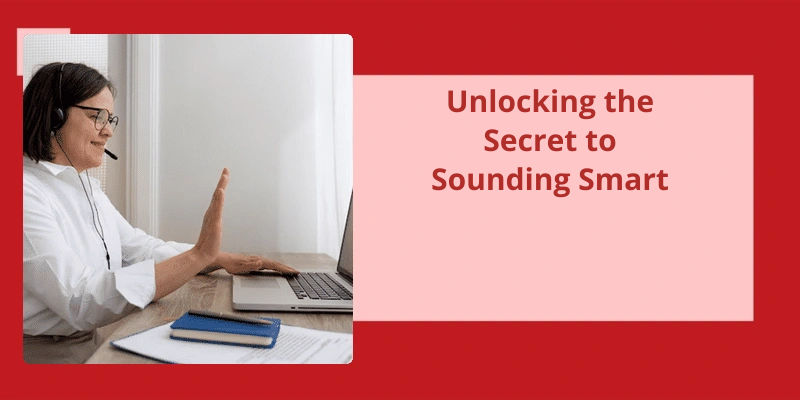The power of eloquence is undeniable. It can captivate an audience, inspire action, and leave a lasting impression. Whether in a professional setting, a social gathering, or even in everyday conversations, being able to communicate effectively and confidently can greatly benefit one's success and relationships. Some people possess a natural gift for speaking eloquently, while others may struggle to articulate their thoughts and ideas clearly. However, with the right techniques and strategies, anyone can enhance their speaking skills and sound smarter and more articulate. In this article, we will explore nine practical tips to help you improve your eloquence and boost your confidence when speaking.
Why Do People Try to Sound Smarter Than They Are?
Humans are social beings who constantly seek validation and acceptance from others. Being perceived as intelligent can lead to increased social status and influence, which is highly desirable for many individuals. However, not everyone possesses innate intelligence or knowledge in certain areas, leading them to resort to sounding smarter than they actually are. This can be a result of a fear of being seen as unintelligent or a desire to fit in with highly educated social circles.
The pressure to appear smart is also amplified in certain environments such as the workplace or academic settings. Individuals may feel the need to impress their superiors, colleagues, or professors with their intelligence in order to gain recognition or opportunities for advancement. This can lead to the use of big words, complex sentence structures, and excessive jargon in an attempt to appear knowledgeable and sophisticated, even if the person doesn’t fully understand the concepts they’re discussing.
Furthermore, social media and the internet have created an environment where everyone has a platform to share their ideas and opinions. In this highly competitive digital space, individuals may feel the need to stand out by using clever wording or presenting themselves as more intelligent than their peers. This can lead to the spread of misinformation or the promotion of pseudoscientific ideas, which can ultimately do harm to individuals or society as a whole.
On the other hand, truly intelligent individuals often prioritize effective communication over sounding smart. They understand the importance of conveying complex ideas in a way that’s easily understandable for their audience. As the saying goes, “If you cant explain it simply, you don’t understand it well enough.”. Therefore, these individuals focus on using clear and concise language, and avoiding overly technical jargon in order to facilitate understanding and create meaningful connections with others.
The desire to sound smarter than one actually is can stem from a variety of motives, including a need for social validation and a desire to fit in with certain social circles or environments. However, the effort to appear smart can also lead to the spread of misinformation and confusion, which ultimately harms society.
Ways to Combat the Pressure to Appear Smart and Promote More Honest, Open Communication.
- Encourage others to ask questions and admit what they don’t know
- Avoid using jargon and instead explain concepts in simple terms
- Admit your own mistakes and areas where you aren’t an expert
- Listen actively to others’ perspectives and opinions
- Acknowledge when others contribute valuable input
- Create a safe space where people feel comfortable being themselves
- Give credit where credit is due instead of taking sole credit for ideas
- Be open to feedback and constructive criticism
- Don’t be afraid to say “I don’t know” or “I need help”
- Prioritize collaboration and teamwork over individual recognition
What Are 5 Words to Make You Sound Smarter?
Language is a powerful tool that we use to communicate with others, express ourselves, and make sense of the world around us. Our choice of words can convey our knowledge, intellect, and sophistication. There are certain words that are likely to make us sound smarter than we actually are, while others might have the opposite effect. The ability to use these words correctly and in context can be a valuable skill in many situations, whether it’s at work, in social settings, or in academic settings.
One of the top words to make you sound smarter is “articulate.”. This word implies a high level of proficiency in expressing oneself clearly and effectively. An articulate person is someone who’s able to convey complex ideas in a straightforward and engaging way. This word can be particularly useful in professional settings, where effective communication is key to success.
Another word that can make you sound smarter is “accolade.”. This term refers to an award or honor given to someone for their achievements or contributions. Using this word shows that you’re familiar with the language of recognition and praise, and that you’re knowledgeable about the types of recognition that are typically given in your field or industry.
“Brevity” is another word that can signal intelligence and sophistication. This term refers to the ability to express oneself concisely and clearly, without unnecessary or superfluous language. Brevity is a valuable skill in many contexts, whether it’s in written communication or in spoken dialogue. The ability to convey complex ideas in a few well-chosen words can be a sign of intellectual maturity and confidence.
“Adulation” is another word that can make you sound smarter. This term refers to excessive or insincere praise or admiration. Using this word correctly demonstrates a knowledge of the nuances of language and the ability to accurately describe complex emotional states. This word can be particularly useful in literary or artistic contexts, where the use of language to communicate deep emotions and complex ideas is highly valued.
Finally, “anomaly” is a word that can make you sound smart. This term refers to something that deviates from the norm, or that’s unusual or unexpected. Using this word suggests that you’ve a keen eye for detail and that you’re attuned to the nuances of difference and change. This word can be particularly useful in scientific or technological contexts, where identifying and explaining anomalies is a key part of the research process.
While these words can be useful in making us sound smarter, it’s important to use them correctly and in context. Using a word incorrectly or out-of-context can have the opposite effect, making us appear foolish or uninformed. Ultimately, the best way to sound smart is to be knowledgeable, articulate, and confident in expressing oneself clearly and effectively.
Their focus and concentration are often perceived as being quiet or reserved, but in reality, they’re just processing information and making sense of it. In this article, we’ll explore why being quiet can actually be a sign of intelligence and how it can benefit individuals in various aspects of life.
Why Do Smart People Tend to Be Quiet?
Smart people take their time to absorb and process information before speaking up. They prefer to think before they speak rather than jumping into conversations without fully understanding the topic at hand. In addition, intelligent people are often introspective and introspection requires silencing the noise around them and tuning inward.
Furthermore, smart individuals are more aware of their own shortcomings and limitations. They understand that they don’t know everything, and this humility allows them to be more cautious and reflective when communicating with others. This also helps them avoid embarrassing situations where they might say something foolish or incorrect.
Another reason why intelligent people are quiet may be that they’re more comfortable in their own company than in social situations. They may prefer to read, think or engage in solitary activities rather than attending social gatherings. These individuals value their alone time and use it to recharge and think about solutions to problems or tasks they’re working on.
Smart people typically appear quiet because they’re thinkers and observers, preferring to process information before speaking up. They’re introspective and aware of their limitations, making them more cautious about what they say and when they say it. These individuals have an innate desire for intellectual stimulation and prefer to engage in more meaningful conversations rather than small talk.
But what exactly sets these individuals apart from the rest? Is it their expansive vocabulary or their ability to effortlessly articulate their thoughts? Let’s explore the qualities that make people sound smart and how you can develop these skills for yourself.
What Makes People Sound Smart?
One of the most important aspects of sounding smart is mastering the art of communication. Being able to express oneself clearly and without relying on jargon or technical terms is key to sounding intelligent. Simplicity is key when it comes to communication, and smart people know how to avoid convoluted language that only serves to confuse their audience.
Another important factor that makes people sound smart is their ability to connect with their listeners. Being able to cultivate a rapport with an audience is essential to making them feel at ease and receptive to your message. Smart people know how to use their body language and tone of voice to convey confidence and authority, while still remaining approachable and engaging.
Smart people are also typically well-informed about the topics they discuss. They’ve done their research and are able to speak knowledgeably about a variety of subjects. However, simply having a lot of information isnt enough; truly smart people know how to distill complex ideas down into simple, easy-to-understand concepts that anyone can grasp.
Another key aspect of sounding smart is having a strong verbal brand. This means developing a clear and consistent voice that sets you apart from others. A good verbal brand is confident, articulate, and memorable, and it helps people remember you and your message long after youve finished speaking.
The Importance of Active Listening in Communication and How It Can Make People Sound Smarter
Active listening is a crucial aspect of effective communication. It involves attentively engaging with someone during a conversation and showing interest by giving appropriate responses.
By actively listening, people can pick up on important details, avoid misunderstandings, gain insight, and build better relationships with others. Active listening can also make individuals appear more intelligent and knowledgeable, as it allows them to respond to others in a thoughtful and informed manner.
Now that we’ve covered the basics of how to sound smarter than you really are, let’s delve deeper into some specific tips and tricks that you can implement in your everyday life. By following these easy steps, you’ll be able to impress your colleagues, friends, and family with your newfound intelligence. So, without further ado, let’s get started!
How Do You Sound Smarter Than You Really Are?
Being perceived as intelligent is a desire many individuals share, and while intelligence can’t be faked, there are ways to sound smarter than you really are. Active listening is a fundamental aspect of appearing intelligent, as it shows the speaker respect and reflects a knowledgeable interest in the conversation. By asking thoughtful questions and demonstrating comprehension, one can convey a sense of intelligence without performing complicated feats of rhetoric.
Posture can also play a role in how others perceive your intelligence. Standing tall communicates self-confidence and assertiveness, which can appear intellectually dominant. Conversely, this can be overdone, so it’s essential to find a balance that exudes self-assurance while remaining approachable. The use of crutch words, such as “um” or “like,” can be a verbal cue for insecurity or lack of knowledge, so it’s important to minimize these during conversation.
Speaking slowly and deliberately can provide the appearance of thoughtfulness and intelligence. By taking time to formulate responses to questions and reflect before speaking, one can demonstrate intellectual curiosity and a desire to convey depth of knowledge. Reading frequently and widely can also bolster ones knowledge base and improve communication skills, allowing for more thoughtful insights and opinions.
Assertiveness and control can also project intelligence, especially in group communication situations. By leading conversations and steering discussions towards areas of expertise, one can influence the perception of their intelligence positively. However, it’s crucial to avoid appearing overbearing or dismissive, as this can have a detrimental effect on social interactions.
Finally, it’s essential to avoid using complicated language or excessively using initials or acronyms. While it may seem fashionable to use obscure vernacular, the purpose of communication is to convey meaning effectively, and using language that’s inaccessible undermines this goal. The use of glasses can also create an intellectual impression, but this shouldn’t be the focal point of ones appearance.
In summary, it’s possible to sound smarter than you really are by actively listening, focusing on posture, reducing crutch words, speaking deliberately, reading more, taking control, avoiding complex language, and projecting an intellectual image. Improving communication skills requires practice, but with time, it’s possible to develop a convincing facade of intelligence. However, it’s essential to remember that true intelligence isn’t only about the perception of others but also an enduring trait that requires constant effort and dedication to enhance.
How Can Body Language Affect the Perception of Intelligence?
- Positive body language can make someone appear more confident and competent, leading to the perception of higher intelligence.
- Negative body language, such as slouching or avoiding eye contact, can make someone appear less confident and competent, leading to the perception of lower intelligence.
- The use of gestures and facial expressions can also enhance communication and create a more positive perception of intelligence.
- Matching body language with verbal communication can further reinforce the perception of intelligence. For example, a confident posture while delivering a well-organized speech.
- However, cultural differences must also be considered as certain body language cues may hold different meanings in different cultures.
When it comes to communication, being perceived as intelligent is more than just having a large vocabulary or spouting off facts. The way you talk, your tone, energy, and engagement play a major role in how others perceive your intelligence. So, how can you develop the skills to talk like a smart person? Let’s explore some strategies that can help you become a more effective communicator.
How Do Intelligent People Talk?
When it comes to how intelligent people talk, their primary focus is on initiating the conversation with the right tone and energy. Smart individuals understand the significance of setting the tone because it sets up the entire context of the conversation. By being attentive to energy levels and body language, they can understand the nature of the listener and adapt accordingly. When they communicate, they speak with conviction and consideration, which helps them steer the conversation to a meaningful direction.
The art of making eye contact is a skill that comes naturally to intelligent people. They understand that establishing eye contact is imperative because it shows that theyre fully engaged in the conversation and willing to listen. Eye contact also exudes confidence and assertiveness, which creates mutual respect between the speaker and the listener. Furthermore, making eye contact can help the speaker pick up non-verbal cues that could assist in further directing the conversation.
Smart people tend to ask intelligent questions, which serve two primary purposes. Firstly, smart questions demonstrate that the speaker is genuinely interested in the conversation at hand. Secondly, smart questions encourage the listener to provide meaningful feedback. Intelligent people can carefully construct questions that allow for expansive answers, which result in deeper insights. They also know when to ask follow-up questions, which ensures that theyre extracting as much information as possible.
Compliments are an essential part of conversation. Intelligent people make a conscious effort to give genuine compliments, which can make the listener feel seen and heard, which helps to foster connections. By acknowledging another persons strengths and abilities, the speaker creates a positive environment, which leads to more productive discussions. Furthermore, when people feel appreciated, theyre more likely to be forthcoming with information and ideas.
Humor and storytelling are great tools that smart people use to engage their audience. A joke or anecdote can help to break down barriers and lower peoples defences. It can help create a relaxed atmosphere, which encourages people to be more forthcoming. Smart storytellers have a gift for making things interesting, even if it’s a mundane topic. They know how to use engaging details and vivid descriptions to bring their stories to life, which keeps the listener hooked.
Lastly, intelligent people understand that good communication goes both ways. They actively listen to the listener, which shows that they’re interested in what the person has to say. They pay attention to their body language, tone of voice, and any non-verbal cues that hint at what theyre feeling. By listening, theyre also showing respect to the listener, which encourages them to reciprocate. Being an active listener is an important part of good communication, and intelligent people understand this.
Conclusion
Ultimately, the ability to communicate effectively is a highly valued asset in various aspects of life. It can help individuals to articulate their thoughts and ideas clearly, build rapport with others, and leave a lasting impression. While intelligence certainly plays a role in one's ability to express themselves eloquently, it isn’t the only factor. By incorporating the nine techniques to improve one's eloquence, anyone can sound smarter and more articulate regardless of their level of intelligence. These techniques, such as speaking slowly and confidently, using appropriate vocabulary, and structuring sentences effectively, can be learned and honed with practice. So, whether you're delivering a presentation, engaging in a debate, or simply having a conversation, these techniques can help you sound smarter and leave a lasting impression.






